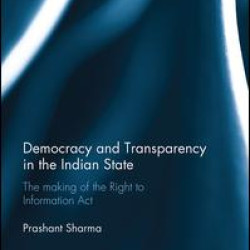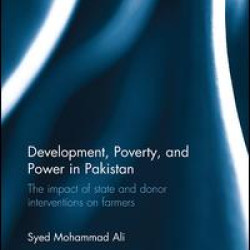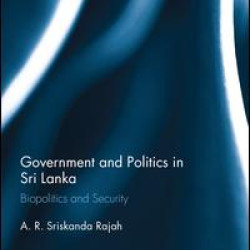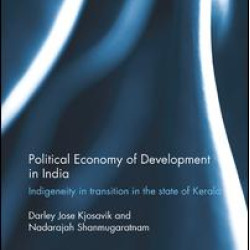South Asian Politics
Brand: Taylor & Francis
Model: Stock
The enactment of the national Right to Information (RTI) Act in 2005 has been produced, consumed and celebrated as an important event of democratic deepening in India both in terms of the process that led to its enactment (arising from a grassroots movement) and its outcome (fundamentally altering t..
₹2,789.98 ₹3,487.48
Brand: Taylor & Francis
Model: Stock
This book analyses the unprecedented, democratic transformation which is currently taking place in India, by employing a new analytical framework of the "vernacular public arena" where negotiations, dialogues, debates and contestations occur among "vernacular publics." This reflects the profound cha..
₹2,569.66 ₹3,212.08
Brand: Taylor & Francis
Model: Stock
Rural development remains a major challenge for governments of developing countries such as Pakistan. This book discusses the political economy of agrarian poverty and underdevelopment in the region. It provides an in-depth exploration of the combined impact of state and donor interventions, as well..
₹2,789.98 ₹3,487.48
Brand: Taylor & Francis
Model: Stock
This book provides a micro-historical analysis of the emergence and contemporary dynamics of recent ethnic sub-nationalist insurgencies in South Asia. Using comparative case studies, it discusses the causes of each insurgency, analyses the trajectory and dynamics of each, including attempts at resol..
₹2,716.54 ₹3,395.68
Brand: Taylor & Francis
Model: Stock
In 1991, India officially embraced the policy of neo-liberal reforms by signing the GATT agreement, which exposed the country, its society, culture and institutions to the various forces of globalisation. Globalisation as such may not be new to India, for the country has been exposed to the external..
₹2,716.54 ₹3,395.68
Brand: Taylor & Francis
Model: Stock
This book analyses where Sri Lanka stands as a state that has in place liberal democratic state-institutions but exhibits the characteristics of an authoritarian state. Using Michel Foucault’s concept of biopolitics, the author argues that Sri Lanka enacted racist legislations and perpetrated mass-a..
₹8,078.40 ₹10,098.00
Brand: Taylor & Francis
Model: Stock
This book traces the triangular strategic relationship of India, Pakistan and China over the second half of the twentieth century, showing how two enmities – Sino-Indian and Indo-Pakistani – and one friendship – Sino-Pakistani – defined the distribution of power and the patterns of relationships in ..
₹2,643.10 ₹3,303.88
Brand: Taylor & Francis
Model: Stock
This book compares and contrasts Muslim and Sikh communities in pre- and post-Partition India. Mapping the evolving discourse on minority rights, the author looks at the overlaps between the Constitutional and the majoritarian discourse being articulated in the public sphere and poses questions abou..
₹2,789.98 ₹3,487.48
Brand: Taylor & Francis
Model: Stock
This collection explore the stability and cohesion of Pakistan through issues of political Islam, minorities, wider political trends, and the economic impacts of the recent floods to seek to explain some of the key drivers of change within Pakistan, and to reflect on the dynamics of US-Pakistan rela..
₹8,445.60 ₹10,557.00
Brand: Taylor & Francis
Model: Stock
In the Global South, indigenous people have been continuously subjected to top-down, and often violent, processes of post-colonial state and nation building. This book examines the development dilemmas of the indigenous people (adivasis) of the Indian state of Kerala. It explores the different facet..
₹2,716.54 ₹3,395.68
Brand: Taylor & Francis
Model: Stock
This book identifies and analyses issues related to the making and implementation of public policies in Bangladesh over the last four decades (1972-2012). It explores the implications of the change that has taken place in policy and governance environment in Bangladesh. Focusing on several important..
₹8,812.80 ₹11,016.00
Brand: Taylor & Francis
Model: Stock
This book classifies recruitment techniques of rebel groups into two types, coercion and inducement, and develops a theory of rebel recruitment that simultaneously addresses agency problems inside rebel groups and the rebel-state contest over information...
₹6,976.06 ₹8,720.08













